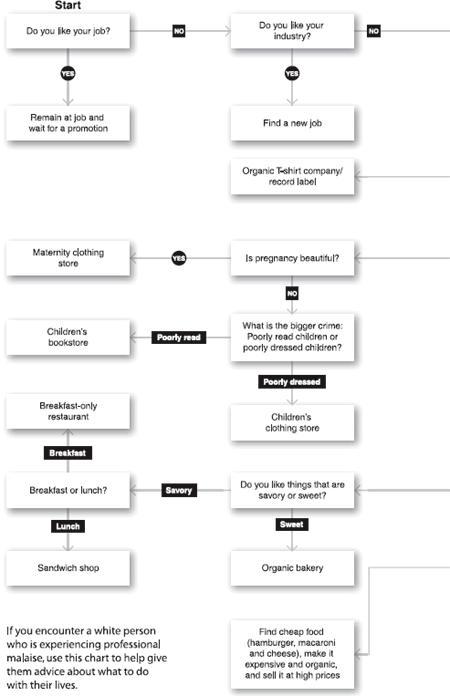Stuff White People Like (29 page)
Read Stuff White People Like Online
Authors: Christian Lander
Tags: #General, #Humor, #Topic, #American wit and humor, #Popular Culture, #Adult, #Popular culture - United States, #Race identity, #Whites, #Satire And Humor, #Topic - Adult, #Race awareness, #Whites - United States


By the time they reach college, the type-A DJ has morphed into the type-B DJ, and they have begun to experiment with pop songs and music from the ’80s. Showing that they are into a diverse mix of music earns them much respect with the crowd, and being able to go from 50 Cent to Corey Hart shows their exceptional range and growth as a “musician.”
After graduation, white people will continue to pursue this passion and will assemble a group of friends who love to see them “spin.” White people prefer the word
spin
because it sounds cooler than “choosing songs for people to listen to.”
Note: DJs have the best talent-to-groupie ratio of any career.
130 Carbon Offsets
As much as white people would love to be able to do everything in an Earth-friendly way, the reality of their needs sometimes just doesn’t match up to current environmental options. For example, when a white person needs to travel to India for a yoga retreat, they are going to have to get on a plane and in the process release tons of carbon dioxide into the air. Though simply avoiding air travel would be a good way to solve this, that’s just not a fair thing to ask. Fortunately, there are carbon offsets.
A carbon offset occurs when a white person does something bad to the environment, like flying on an airplane or buying an SUV, and then simply gives some money to a company like TerraPass, which then plants a bunch of trees to make up for the infraction. In much the same way that Catholics sin and then ask forgiveness in confession, white people commit a sin and then just pay a bunch of money to remove the guilt. It is an astonishingly efficient system.

The system is also useful since white people can sit on a plane surrounded by other travelers, yet know deep down that they are saving the Earth while everyone else on the plane is destroying it—even though they are all on the same flight.
Since it is very difficult for white people to check up on the status of their carbon offsets, this is an excellent opportunity for personal financial gain. Whenever a white person says that they are going to take a flight, ask if they are paying for a carbon offset. If they say no, then you should introduce them to your new carbon-offset company, but be as unclear as possible about exactly how you will create the offset. Then buy yourself a Toyota Prius.
131 Following Their Dreams
White people are required to support anyone who decides to follow their dreams, regardless of the likelihood for success. This is one of the most important things you can ever learn.
Because white people generally do not have to worry about money in any serious way, or food, or shelter, or health care, their number-one concern is about the best way to make themselves happy. This eats up a tremendous amount of their time and has created many lucrative side industries, such as therapy, writer’s workshops, acting classes, screenwriting software, and academia.

From a very young age, white people are told that the greatest thing they can do is to follow their dreams, and that they should not listen to anyone who tries to hold them back. Within white culture this law is about as unbreakable as gravity.
Generally a white person is most likely to follow their dream between the ages of 18 and 25. The majority will wait until they finish college before moving away to chase their dream of being an actor, writer, photographer, director, artist, musician, DJ, or producer.
If you meet a white person who has just finished college and has told you that they are moving to Brooklyn to become a writer, you should never under any circumstances suggest that they are making a mistake. When they are this young, it’s best to say, “Of course, you have to take a chance now, because you may not have it when you are older. But I know you’re going to make it.” This last bit of encouragement will virtually guarantee a free place to stay when you visit New York City.
Do not feel bad for the white person or their parents. Following their dreams at this age is completely acceptable since failure will only really result in later acceptance to law school and perhaps a few sizeable loans from their parents. Depending on their degree and their parents, they will be able to catch up to their non-dream-following counterparts within five years. So supporting them at this stage is not really all that destructive.
However, some white people do
not
follow their dreams immediately out of college, and here is where the danger lies. As they begin to get older and feel disenchanted with their current job, they begin to think back to the dreams they had when they were younger. While it would seem logical that a real friend would say, “Hey, you just turned forty, do you really think it’s a good idea to get your PhD in English? You know you won’t get tenure until you’re sixty, right?” nothing could be further from the truth.
Regardless of how catastrophic and irresponsible their actions are, if the end goal is to “follow their dreams” you must support them blindly or else you will be seen as a Simon Cowell–esque figure who is hated by all as a crusher of hope.
It is best to say something funny that also implies inevitable success, like “Can I be an extra when the movie gets made?” or “I expect a signed first edition!” It does not matter if you are lying.


132 Not Having Cash
A very important thing to know about white people is that in spite of their considerable wealth, they hate to carry cash. Ask the nearest white person how much cash they have on them. If they are under 35, the answer will likely be under $10.
For white people cash leads to all sorts of problems. First, they are very afraid of losing their cash either by accident or through some kind of robbery. If they lose a credit card or get it stolen, they make a few phone calls and they can sleep easy at night. Not the case with a $20 bill.
The other reason is that white people are obsessed with credit card rewards. Just ask them and they’ll tell you how their credit card rewards them with airline miles, Amazon points, or even cash back. If they have to pay for something in cash, it just kills them to know that they are missing out on a chance to get rewards. They also hate pennies.

Cash also poses problems for white people in group settings. Because of the amount of time they spend in bars and restaurants, they need a system that allows them to split a bill accurately and fairly among the party. A pile of $20s is simply a shot in the dark.
But the real reason why white people have so little cash is that their schedules take them from home to work to sandwich shops to work to Whole Foods to home and then to bed. There is simply no time to stop at an ATM.
This information can be useful if you bring a white person to an ethnic restaurant that only takes cash. Never assume that white people will have money, and unless you want to give out a short-term loan, you should
always
tell a white person in advance if a restaurant is cash only.
133 Adopting Foreign Children
Much as white people tend to prefer rescue dogs over purebreds, when it comes to children an increasing number of white people are turning to foreign countries. Africa and Asia are supplying the majority of these babies to white couples, who cannot wait to begin the journey of raising a foreign child.
On some levels, the foreign child is superior to the home-grown one, since the parents will always know that they took the child from a bad situation and brought him or her to a better one. This creates an important feeling of debt that will help to ensure the child remains loyal and obedient to the parents, something missing in many white children.

